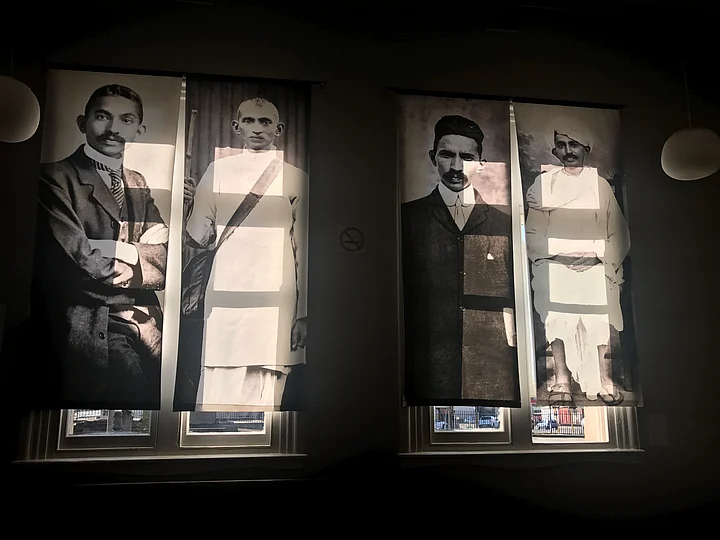(This story was first published on 2 October 2017 and is being reposted from The Quint’s archives on the occasion of the birth anniversary of Mahatma Gandhi.)
Pietermaritzburg – this is where I found myself in 2017. I was in Durban for a conference, and the nationalist in me just HAD to go and visit the station where Mohandas Karamchand Gandhi was thrown out of the train for being “coloured”. And how that one incident made Attorney Gandhi rethink his life, and the life of the nation he had been born into. I wanted to experience that very moment that gave birth to the non violence movement, which eventually won India its freedom.
The best refresher for that moment in history is this scene from Sir Richard Attenborough’s Gandhi.
Years later, this is how Gandhi would look back at that moment.
I was afraid for my very life. I entered the dark waiting-room. There was a white man in the room. I was afraid of him. What was my duty? I asked myself. Should I go back to India, or should I go forward with God as my helper, and face whatever was in store for me? I decided to stay and suffer. My active non violence began from that date.Mahatma Gandhi
A place of such immense historic significance. And yet, almost impossible to find, as I found out on my journey to Pietermaritzburg.
I had flagged down a cab in Durban, asking the cabbie to take me to Pietermaritzburg. He was delighted, since it was where his partner of 15 years lived. They had had three children, but were yet to get married, as he hadn’t been able to collect enough money for the dower, and the massive feast that is core to any African wedding.
“Why Pietermaritzburg?” he asked. “How about I take you to a safari now? Lots of zebras and giraffes at this time of the year.”
I told him Pietermaritzburg it had to be.
“Kandy?” he asked. “Kandy went to Maritzburg?”
Unsolicited, I decided to use the two-hour drive to update him on Gandhi’s encounters with racism and its impact on India’s freedom movement.
1893. Gandhi was in Durban as a legal counsel to the merchant Dada Abdullah. Abdullah asked him to visit Pretoria in the Transvaal, on work and Gandhi, as always booked into the first class compartment. A European who spotted him, was aghast. “Coolies” and non-whites always travelled in the van, or the third class compartment at best. Gandhi produced his ticket, protested, only to be thrown out of the train at the Pietermaritzburg station.
The cold was extremely bitter. My overcoat was in my luggage, but I did not dare to ask for it, lest I be insulted again. So I sat and shivered.Mahatma Gandhi
My cabbie seemed to feel the cold. He looked into the rear view mirror to hint that somethings were still the same and asked, “Even in your country? Discrimination?” There were so many ways in which I could have answered that. Rich composite culture. Diversity. Religion, caste, gender. Lynching, rape, beating. Even the story of another young man who was not just thrown off a train but killed by a mob.
I artfully dodged that question with a “Ah, we’ve reached.”
As we drove into Pietermaritzburg, my eyes began to scan for boards announcing Mahatma’s adventures in the town. I looked for large arrows leading the way to the railway station. What did I find? Nothing.
I encountered NOTHING. Not even a hint that “Gandhi was here”. We drove round and round the town for over an hour. The cabbie poked his head for several quick queries. “Kandy?” he would ask. “Kandeee???!!!” they would answer, bemused.
Finally, with some assistance from Google Maps, we came upon the lonely Maritzburg station, a red colonial style building. Quite imposing really, made more enticing by the hour long hunt for it. My phone camera got working.
No ticket to enter. And no one within. Though Narendra Modi had clearly beaten me to it.
Barring the sleepy old guard at the entrance, I was alone. No tourists. No staff. Absolutely alone to relive, recreate the moment that must have been. I quite revelled that quiet luxury, taking in the history. This aborted trip to Pretoria, had led Gandhi to embark on a much greater journey.
Here’s my badly shot video of the Pietermaritzburg station.
Did time stand still in that moment when the idea of non violence was born?
It was wonderful finding you in Pietermaritzburg, Mohandas Karamchand Gandhi. This time, not peacefully within the pages of book, but on a desolate platform. In a state of anger, confusion and helpless protest against discrimination – one that several young Indians today would identify with.



